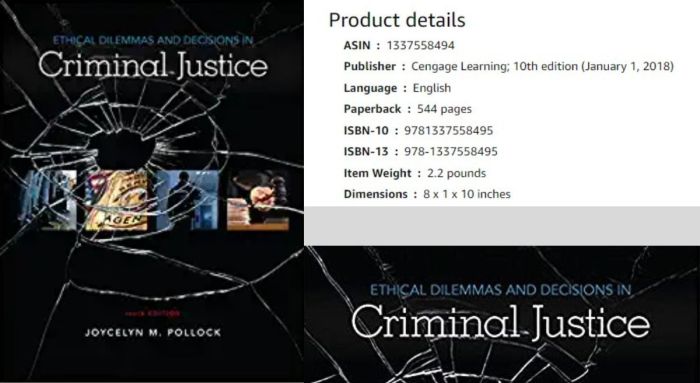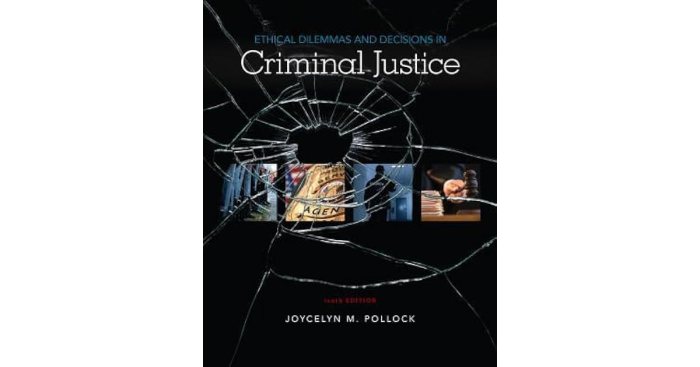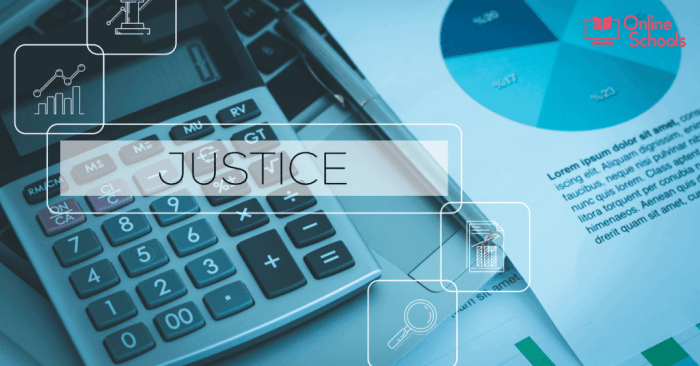Ethical dilemmas and decisions in criminal justice 10th edition – In the realm of criminal justice, the 10th edition of “Ethical Dilemmas and Decisions” delves into the intricate web of ethical quandaries faced by professionals in the field. This comprehensive guide provides an in-depth exploration of the challenges and complexities that arise in law enforcement, corrections, and the courts, offering valuable insights for ethical decision-making in this critical domain.
The text delves into the diverse types of ethical dilemmas encountered by criminal justice professionals, examining the factors that shape ethical decision-making in this high-stakes environment. It further explores the ethical models and principles that guide decision-making, highlighting the interplay of values, laws, and personal beliefs.
Ethical Dilemmas in Criminal Justice

Ethical dilemmas are common in criminal justice, where professionals must balance competing values and principles. These dilemmas can arise in law enforcement, corrections, and the courts.
In law enforcement, officers may face dilemmas involving use of force, racial profiling, and entrapment. In corrections, professionals must balance punishment with rehabilitation and consider the ethical treatment of prisoners. In the courts, judges, prosecutors, and defense attorneys must navigate issues of judicial bias, prosecutorial misconduct, and witness intimidation.
Factors influencing ethical decision-making in criminal justice include personal values, organizational culture, and legal constraints.
Ethical Decision-Making in Criminal Justice: Ethical Dilemmas And Decisions In Criminal Justice 10th Edition

Ethical decision-making models guide criminal justice professionals in resolving ethical dilemmas. These models emphasize values, principles, and laws.
Values are personal beliefs about right and wrong, while principles are more general guidelines for ethical conduct. Laws provide a legal framework for ethical decision-making.
Ethical decision-making in criminal justice can be challenging, especially in complex and high-stakes situations. Professionals must weigh competing values and principles and consider the potential consequences of their decisions.
Ethical Issues in Law Enforcement
Law enforcement officers face ethical dilemmas involving use of force, racial profiling, and entrapment.
- Use of force: Officers must balance the need to protect public safety with the duty to avoid excessive force.
- Racial profiling: Officers must avoid discriminatory practices that target individuals based on race or ethnicity.
- Entrapment: Officers must not induce individuals to commit crimes they would not otherwise have committed.
Balancing public safety with individual rights is a key ethical challenge in law enforcement.
Ethical Issues in Corrections, Ethical dilemmas and decisions in criminal justice 10th edition
Corrections professionals face ethical dilemmas involving prisoner treatment, rehabilitation, and parole.
- Prisoner treatment: Professionals must ensure that prisoners are treated humanely and with respect.
- Rehabilitation: Professionals must balance the goals of punishment and rehabilitation, providing opportunities for prisoners to improve their lives.
- Parole: Professionals must carefully consider the risks and benefits of releasing prisoners on parole.
Balancing punishment with rehabilitation is a central ethical challenge in corrections.
Ethical Issues in the Courts
Judges, prosecutors, and defense attorneys face ethical dilemmas involving judicial bias, prosecutorial misconduct, and witness intimidation.
- Judicial bias: Judges must avoid making decisions based on personal prejudice or bias.
- Prosecutorial misconduct: Prosecutors must adhere to ethical rules and avoid tactics that could undermine the fairness of a trial.
- Witness intimidation: Attorneys must protect witnesses from threats or coercion.
Ensuring a fair and impartial justice system is a primary ethical challenge in the courts.
Ethical Training and Education in Criminal Justice
Ethical training and education are essential for criminal justice professionals.
Training programs help professionals develop the skills and knowledge needed to make ethical decisions. They cover topics such as ethical decision-making models, legal and ethical standards, and case studies.
Ethical training can enhance professionals’ ability to recognize and resolve ethical dilemmas, promote ethical conduct, and build public trust in the criminal justice system.
Question & Answer Hub
What are the key ethical dilemmas faced by criminal justice professionals?
Ethical dilemmas in criminal justice include issues of use of force, racial profiling, prisoner treatment, rehabilitation, prosecutorial misconduct, and witness intimidation.
How can ethical decision-making be improved in criminal justice?
Ethical decision-making in criminal justice can be improved through ethical training and education programs, which provide guidance on ethical principles, decision-making models, and the ethical implications of various actions.
What are the ethical challenges of balancing public safety with individual rights in criminal justice?
Balancing public safety with individual rights in criminal justice requires careful consideration of the potential risks and benefits of different actions, as well as the ethical principles of fairness, justice, and due process.
